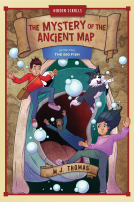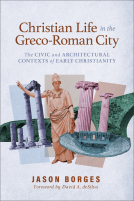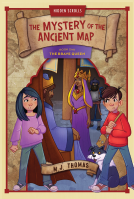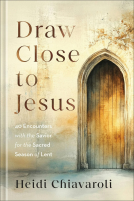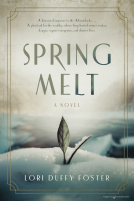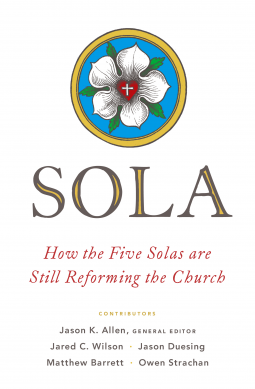
Sola
How the Five Solas Are Still Reforming the Church
by Jason K. Allen (General Editor)
This title was previously available on NetGalley and is now archived.
Send NetGalley books directly to your Kindle or Kindle app
1
To read on a Kindle or Kindle app, please add kindle@netgalley.com as an approved email address to receive files in your Amazon account. Click here for step-by-step instructions.
2
Also find your Kindle email address within your Amazon account, and enter it here.
Pub Date 1 Jan 2019 | Archive Date 1 Jan 2019
Talking about this book? Use #Sola #NetGalley. More hashtag tips!
Description
Discover why the fundamentals of the Reformation still matter today
Why do people get so excited about a bunch of Latin phrases, that some guys in Europe came up with 500 years ago? Sure, those five Latin phrases have defined Protestantism for those 500 years, but why do they matter today? To my church? For my life? What’s the big deal about all these solas anyway? These ones:
Sola scriptura-Scripture alone
Sola fide-Faith alone
Sola gratia-grace alone
Solus Christus-Christ alone
Soli Dei Gloria-To the glory of God alone?
Sola is a winsome, inspiring introduction to these five pillars of the Reformation, showing not just what they are but why they’re important for the Christian life today. Edited and compiled by Jason Allen, Sola will illuminate these core truths that have been reforming the church all along. And it may just get you excited about nerdy Latin phrases too.
Available Editions
| EDITION | Other Format |
| ISBN | 9780802418739 |
| PRICE | $12.99 (USD) |
| PAGES | 128 |
Average rating from 10 members
Featured Reviews
 Deborah W, Reviewer
Deborah W, Reviewer
"Sola" is about the five solas of the Reformation. A different author wrote about each sola, so the writing style varied, but it's more preaching style than academic. While anyone can learn from the essays, several authors talked about how understanding the solas impacts the church so the intended audience may be the church leadership. For each sola, the author talked about what the phrase means, where the principle is found in Scripture, what prompted Luther to include the idea in his writings, and how these truths make a difference in our churches and lives today. It provided a good introduction to the solas, and I'd recommend this book to anyone who is interested in an overview of them and their impact.
 Kenson G, Reviewer
Kenson G, Reviewer
For many, the five solas are only Latin phrases that currently do not have much relevance. However, when we meditate on what these phrases imply for our life, we get a lot of spiritual gain. This book helps us to know, the Solas, from a biblical, historical and pastoral perspective. And I love that, because it not only tells us about history but it also leads us to the Scriptures and how to apply the principles derive from each one.
Each of the authors participating in this book do an excellent job, allowing readers to have clarity about each Sola: Sola Scriptura, Sola Gratia, Sola Fide, Sola Fide, Solus Christus, Soli Deo Gloria.
Reading this book allows us to better understand our protestant heritage. Personally I enjoyed the chapter of Sola Fide and Solus Christus, although of course for a better understanding of the whole, it is necessary to read all the chapters.
Another detail that I like is that there are many references to the Scriptures, so when it is necessary to talk about the ones we can go and study each quote or biblical passage.
I absolutely loved every paragraph of Sola. As someone who loves Reformation history (and had just completed Bainton's 'Here I Stand' prior to picking up this one), I found every chapter to be a wonderful, accessible primer for those who aren't yet familiar with the five Solas while it simultaneously conveyed the rich, deep truths to those familiar with the Solas already. Each contributing theologian brought a succinct, superb summary along with relevance for both the individual Christ-follower and the church. On a lighter note, I thoroughly enjoyed Jared C. Wilson's cheeky tone in chapter 2 where he expounds on why his assigned sola (Grace Alone) underpins all the others (enumerating why every Sola stems from grace) half-seriously-half-suggesting that his chapter was the most important (and perhaps it is). Sola is a quick read; although the study of its content will never be exhausted.
 Reviewer 451445
Reviewer 451445
I've been in two minds and had to think alot before reviewing Sola. While I've long been aware of Reformation history and the five Sola sayings it's been awhile since I looked at them in any depth and this short book manages to achieve a surprising level of depth in just under 140 tightly packed pages. You won't find much padding here!
This book is a compilation with each writer Jason Allen, Jared Wilson, Jason Duesing, Matthew Barrett and Owen Strachan contributing a chapter each. On the one hand I found much in these chapters (which seemed to me like seminar lectures - not surprising given the academic status of the writers but that's fine) to inspire and thrill and came away with a renewed view of the beauty of Sola Scriptura, Sola Gratia, Sola Fide, Solus Christus and Soli Deo Gloria. In a time when much of the church is turning its back on its biblical and historical foundations the Solas badly need recovering and fresh expression.
There is much to love in this book with highly quotable sections and illustrated with stories from the writer's own lives and I particularly liked the scenes from Narnia (Jason Duesing's chapter) and found Owen Strachan's final chapter the most inspiring of all with the section on Eric Liddell revealing information I was unaware of re circumstances at the end of his life and it sets a profound challenge. I found Strachan's assertion that "The phrase soli Deo gloria was never uttered by the Reformers, though they certainly embraced the concept." both revealing and surprising. Surprised also with the revelation that, "Instead, it was two musicians who introduced this phrase into the Western linguistic bloodstream. Johann Sebastian Bach and George Frideric Handel used to write this latin term - SDG - at the end of their compositions." Well if that's true then I've learned something new!
On the other hand I found some of the writing a little off putting although in fairness these represent very small bits of the book. For me using words like "papacy" (Jared Wilson) is off putting if you want to inspire present and future generations and while I agree that the Roman Catholic church had and has some highly debatable and damaging doctrines, sometimes I felt this book could have been more welcoming or 'warm' towards Catholic people in this present age but the impression (for me anyway) is that anything at all to do with Catholicism is to be rejected. In the introduction we're told that "The five solas are the theological distinctives that separated, and do separate, Protestants from the Roman Catholic Church." This sets the tone for the book and Catholicism is very much enemy territory. While I understand the reasoning I am also aware of many Protestants (including evangelicals) who benefit from sections of Catholic spirituality and attempts at dialogue. While Sola is impressive in explaining the Reformation Solas at the same time this book (in my opinion) leaves little or no room for bridge building or productive dialogue. Matthew Barrett includes a story of a Roman Catholic woman who had no assurance and Barrett was able to share Christ with her but that is one of the few times any actual 'interaction' with Catholicism takes place.
Jared Wilson's and Jason Duesing's use of "antinomianism", and Matthew Barrett's "infused grace" and "What every guilty sinner needs is not an infusion but an imputation." and "...Christ as our propitiation" are examples of using what some might feel is antiquated or over technical language, or at least language with could be explained in a simpler way for a new generation. I'm aware others will disagree with me but that's the feeling I had when reading.
Perhaps that's where my struggle lies. I'm not quite sure who this book is aimed at. If an audience already familiar with the Solas and their history then it's achieved its goal. If a new audience then some of the language needs updating without losing any meaning and, in my view, actually takes away from what is an otherwise inspiring and necessary message. Again other will disagree but I found it a little irritating.
On a lesser point Jason Duesing references Lloyd-Jones on what faith isn't in reference to comparing faith to flying in an airplane, that this is not faith but "trusting in mathematical probability." I found this a little confusing as if you fly you still have to have faith that the pilot is capable and the engineers have checked the mechanics properly!
While there is depth and inspiration in all chapters I'll admit Owen Strachan's final chapter spoke to me profoundly and I've virtually highlighted the entire chapter! When reading of the exploits and achievements of people like Luther it can leave you feeling a bit inadequate so I'll leave you with words from Owen Strachan, "In their return to Scripture, the Reformers recovered the simple beauty and honorable nature of an ordinary Christian walk. They are sometimes known as theologians who advocated lofty formulations and hard-to-understand ideas. But, in truth, the Reformers recovered the heart of the Christian faith."
Soli Deo Gloria!
I would recommend this book with the above caveats.
Thanks to NetGalley and Moody Publishers for ARC. I will post a summarised version of this review on Amazon and Goodreads on publication.
 Joan N, Reviewer
Joan N, Reviewer
The five solas are an essential aspect of the Protestant church. They are a foundation for the church, the authors say, and life giving for believers. This book covers all five and is a good introduction to them. The historical setting of each sola is given and then what they mean for the Christian life.
Each sola is written about by a different author. As is often the case with multiple authors, the writing style and emphasis differs among them. Jason Allen covered Scripture alone. He used 2 Tim. 3:15-17 to show the inspired nature of Scripture and that it is authoritative. I felt he failed to prove that it is our only source of authoritative truth.
Jared Wilson wrote about grace alone. He spent quite a bit of time on Scripture alone and faith alone, almost as much as he did on grace alone. I have found Wilson at times hard to follow. He wrote, “Salvation is all of grace. It's not turtles all the way down, it's grace!” (Loc. 363/1201) What? Turtles? I even read the previous paragraphs to understand the turtle reference. Nothing. (I guess I should have read Green's novel to understand Wilson's theology.)
Jason Duesing wrote about faith alone. He spent quite a bit of time relating Luther's story, how he became a monk and had a conversion experience. Mathew Barrett wrote on Christ alone. He went into the Roman Catholic view in detail. Owen Strachen wrote on God's glory alone. I found his writing to be the most encouraging and full of application, including a good section on suffering.
I recommend this book to Christians who want to know a bit about the solas. The work is not very theologically deep nor very rigorous.
I received a complimentary egalley of this book from the publisher. My comments are an independent and honest review.
 Jeanie S, Reviewer
Jeanie S, Reviewer
Why the Solas matter. The Five solas are theological declarations, but they come with massive personal and congregational implications. They provide the doctrinal infrastructure. for our spiritual lives. They frame our Christian identities and ministries and are perennial touchpoints of theological and spiritual formation. They are not meant to divide the church but they are the essence of the gospel. When we embrace them, we embrace the gospel. When we articulate them, we speak the gospel. When we live consciously of them, we live in the power of the gospel.
Sola Scripture - Scripture alone
Sola Gratia- Grace Alone
Sola Fide-Justified by Faith Alone
Solus Christus- Christ Alone
Soli Deo Gloria - God's Glory Alone
Each one of the solas is taken by chapter by 5 different teachers. I find it interesting that with each different teacher and solus there was a spiritual unity that speaks of the gospel and the Glory of God. Without scripture alone, you cannot have grace alone and without Justified by Faith Alone, you cannot have Christ Alone, and without Christ Alone, you cannot have God's glory alone. They each build on each other to bring us in glory and in the presence of God. Along with a description of each sola, you are given a history of the reformation, the protest and the shift to bring the gospel to the people. Luther's struggle with the law and ultimate declaration of the 95 thesis given on October 31 which is Happy Reformation Day.
I was reminded again of the power of grace. Not to live in antinomianism but to be gospel centered. Not on the side of legalism but also not to be law neglecting or law flippant. I loved this quote How can we be flippant about what reveals the holiness of God? To be flippant about the law is to be flippant about God. To be flippant about the law is to be flippant about worship. Make no mistake the law cannot do what the gospel does. But the law is not bad. It is good. It is good at accomplishing what it is designed to do.
The righteousness we seek is found only in Christ and the solas point to Christ and the work of salvation. The text is easy to read and written with clarity! Highly recommend.
A Special thank you to Moody Publishing and Netgalley for the ARC and the opportunity to post an honest review.
Concise with chapters by various authors, clearly laying out the fundamental importance of sola scriptura, sola gratia, sola fide, solus Christus, and soli Deo gloria in defining our faith and how we live.
This was an enjoyable read, to the point, and while I am very familiar with the history of the Reformation and Martin Luther, I found this to be a great reminder. The chapters are all well laid out and explained in layman's terms, with good analogies and similes to illustrate the points, as well as good historical context. It was interesting to learn the true origin of Soli Deo Gloria, and its connection to Sebastian Bach.
Overall, a great resource and is well suited to serve as an introduction to the 5 solas and how they form the foundations of our Christian faith, or as a great refresher and reminder of the importance of the simple yet powerful doctrines that define our faith.
Disclosure of Material Connection: I received one or more of the products or services mentioned above for free in the hope that I would mention it on my blog. Regardless, I only recommend products or services I use personally and believe will be good for my readers. I am disclosing this in accordance with the Federal Trade Commission's 16 CFR, Part 255: "Guides Concerning the Use of Endorsements and testimonials in Advertising."
 Andrew B, Reviewer
Andrew B, Reviewer
Sola is a helpful little introduction to the "Five Solas" of the Reformation. Each “sola” is treated by a different author, which leads to each chapter reading a little differently. The consistent thread through the five essays is that each is an accessible treatment of the Biblical foundation, Historical foundation, and practical implications of the doctrine for Christian life and practice. The five chapters are:
1. Sola scriptura-Scripture alone
Jason Allen, who also functioned as the editor of the book, is the author of this chapter. The most helpful contribution of this chapter is the concluding section as Allen draws ten application points for the church today. These points are straight forward and a needed word for the church today.
2. Sola gratia-grace alone
Jared C. Wilson wrote this chapter. Here the difference is writing styles between the authors becomes very clear. While the format remains the same, Wilson’s wordsmithing is on full display in his essay/chapter. The greatest contribution here is Wilson’s discussion about the foundational nature of sola gratia for four other “solas.”
3. Sola fide-Faith alone
Jason G. Duesing is the contributing author here. Similar to his work in Mere Hope (which is a worthwhile read!), Duesing leans on “the Inklings” (specifically C.S. Lewis and Tolkien) and weaves their writings into the story of Martin Luther and the birth of the Reformation. The most substantial contribution in this chapter is Duesing’s discussion around the role of God in the nature of our faith.
4. Solus Christus-Christ alone
Matthew Barrett is the author of this chapter. Barrett seemed to be the strongest in the historical theology section of his chapter. The greatest contribution in the chapter, in my mind, is the discussion around the role of the perfect life that Jesus lived in the human need for Christ. In popular-level discussion of this chapter, the death of Jesus is consistently highlighted. Barrett in this chapter well articulates the role of His life in the imputation of His righteousness.
5. Soli Dei Gloria-To the glory of God alone
Owen Strachan is the contributor to the fifth and final “sola.” Strachan acknowledges up front that this phrase was never uttered by one of the Reformers. However, this phrase is significant in the life of the believer today. Of utmost importance for the modern reader is the application of this point to every sphere of the believers' life.
The strengths of the book, as noted above, including the accessibility of each chapter as well as the focus of the authors in showing the impact of the doctrine on the life and practice of the church today. A weakness in the book is that in having five different authors, the authors at times used the same stories from the life of Martin Luther to make different points. In doing this, it left me at times feeling like the book did not unfold as clear and smooth as it could have.
